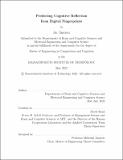| dc.contributor.advisor | Rand, David | |
| dc.contributor.author | Jimenez, An | |
| dc.date.accessioned | 2024-05-24T17:59:57Z | |
| dc.date.available | 2024-05-24T17:59:57Z | |
| dc.date.issued | 2022-05 | |
| dc.date.submitted | 2024-05-20T20:00:28.623Z | |
| dc.identifier.uri | https://hdl.handle.net/1721.1/155059 | |
| dc.description.abstract | While social media is beneficial in facilitating social connections and spreading knowledge on a large scale, its negative impacts — the propagation of misinformation through networks and the emergence of echo chambers in particular — are con- sequential and dangerous, inducing a more divergent rather than cohesive society. What cognitive mechanisms are at play when users decide what to share and who to follow on social media? A recent study provides evidence that users with higher Cognitive Reflection Test (CRT) scores — a popular measure for reflective thinking — are more discerning in their Twitter behavior (Mosleh et al., 2021). While previous research sheds light on this relationship between cognitive reflection and Twitter behavior, there is an opportunity to generalize these correlations to larger populations and across different social media platforms by building a computational model to predict cognitive reflection from social media activity, which is the focus of my project. Applying machine learning techniques to the dataset used in Mosleh’s study, I created a model that predicts CRT scores from Twitter features such as Tweet content and accounts followed (followees) and also determined which features and combinations of features are most predictive of cognitive reflection. Correlations between predicted and actual CRT scores are strongest when predicting with information related to followees (𝑟 = 0.25) and followee bios (𝑟 = 0.24). Combining followee features and applying different regression models improves prediction accuracy (𝑟 = 0.29). These conclusions help form a more complete picture of how cognitive reflection relates to social media activity, which has important implications for how we can encourage more intentional social media use and ultimately, reconnect divisive populations online. | |
| dc.publisher | Massachusetts Institute of Technology | |
| dc.rights | In Copyright - Educational Use Permitted | |
| dc.rights | Copyright MIT | |
| dc.rights.uri | http://rightsstatements.org/page/InC-EDU/1.0/ | |
| dc.title | Predicting Cognitive Reflection from Digital Fingerprints | |
| dc.type | Thesis | |
| dc.description.degree | M.Eng. | |
| dc.contributor.department | Massachusetts Institute of Technology. Department of Electrical Engineering and Computer Science | |
| dc.contributor.department | Massachusetts Institute of Technology. Department of Brain and Cognitive Sciences | |
| dc.identifier.orcid | 0000-0003-4773-8128 | |
| mit.thesis.degree | Master | |
| thesis.degree.name | Master of Engineering in Computation and Cognition | |
